PLAY Introduction
The Sponsor Interview is the first step in a successful project! This is where you will get to know the Sponsor and understand their vision, business case and objective for the project. Even if you have worked with the Sponsor before, this sit down conversation will be well worth the time.
PEOPLE
2-3 depending if you are just facilitating or the project manager on the project.
TIME
30-60 Minutes. No one wants to be in a meeting longer than needed. Try to keep it short and sweet.
NINJA LEVEL
Novice to Master. Anyone can facilitate a successful interview meeting!
PREP WORK
PEOPLE
Everyone does better when they are prepared. If you want to put everyone at ease, send them the list of questions ahead of the meeting. This way nothing is a shock and you may save time if answers are prepared ahead of the meeting – for the win!
PLACE
Virtually or in-person it is critical that everyone has face-time with each other. So make sure that if attending virtually that everyone can connect in video chat. You will also need to share ideas, so a whiteboard is important and a space that fosters creativity and innovation.
THE PLAY
All of our plays are five steps or less! However, you may need to run multiple plays to get the most out of this one. Don’t worry – you can do it! Learn the play, rehearse it regularly, apply it in the field and debrief on the outcomes. If it worked well, use it again; if it didn’t, find out why. Are there new factors in the system you need to consider, or do you just need to keep practicing? If you need help or have questions on this play, contact us!
01
SET THE STAGE
Who are the players?
Every winning team knows which players to have on the field and what talent you need on the ready. To successfully deploy this play you will need the following roster:
![]() Meeting Facilitator: Likely this is you! But you don’t have to do it alone, ask a friend (think of it like a football team that has a coach for different parts of the team). Skills needed:
Meeting Facilitator: Likely this is you! But you don’t have to do it alone, ask a friend (think of it like a football team that has a coach for different parts of the team). Skills needed:
- Keep the team focused on the goal!
- Foster a positive and creative space for all
- Organized and prepared to run play
![]() Sponsor: This must be someone who has skin in the game. In sports this would be the team owner, someone who has an investment in seeing the team win. In business this is typically a project sponsor or product owner who charters the project. Skills needed:
Sponsor: This must be someone who has skin in the game. In sports this would be the team owner, someone who has an investment in seeing the team win. In business this is typically a project sponsor or product owner who charters the project. Skills needed:
- Authority to fund the project and team
- Engaged in outcomes and supporting the team
- Biggest supporter in the stands
![]() Project Manager: Project managers play the lead role in planning, executing, monitoring, controlling and closing projects. They are accountable for the entire project scope, project team, resources, and the success or failure of the project. Effective project managers need more than technical know-how. The role also requires a number of non-technical skills, and it is these softer skills that often determine whether a project manager — and the project — will be a success. Skills needed:
Project Manager: Project managers play the lead role in planning, executing, monitoring, controlling and closing projects. They are accountable for the entire project scope, project team, resources, and the success or failure of the project. Effective project managers need more than technical know-how. The role also requires a number of non-technical skills, and it is these softer skills that often determine whether a project manager — and the project — will be a success. Skills needed:
- Leadership
- Communication
- Scheduling
- Risk Management
- Cost Management
- Negotiating
- Critical Thinking
- Task Management
- Quality Management
- Sense of Humor
Get the field ready!
![]() Schedule the meeting in advance. Don’t wait until the last minute to schedule the meeting. You want people to be excited about it but not so last minute that they have no time to prepare.
Schedule the meeting in advance. Don’t wait until the last minute to schedule the meeting. You want people to be excited about it but not so last minute that they have no time to prepare.
![]() Include an agenda. Set expectations – this will help keep your meeting on track. Include schedule and any prep work needed. Also let them know if it is okay to invite others or not. Remember that if you have to many people in the meeting, it will be difficult to facilitate brainstorming sessions without breaking out into smaller groups.
Include an agenda. Set expectations – this will help keep your meeting on track. Include schedule and any prep work needed. Also let them know if it is okay to invite others or not. Remember that if you have to many people in the meeting, it will be difficult to facilitate brainstorming sessions without breaking out into smaller groups.
![]() Prep the room. Arrive early and get ready. If it is in a physical room, get whiteboards ready, enough chairs for everyone, water and snacks are always a hit! If virtually, a central location for notes, brainstorms and follow-up items. Test connectivity in the meeting room and make sure there is enough seats for all participants.
Prep the room. Arrive early and get ready. If it is in a physical room, get whiteboards ready, enough chairs for everyone, water and snacks are always a hit! If virtually, a central location for notes, brainstorms and follow-up items. Test connectivity in the meeting room and make sure there is enough seats for all participants.
02
CORE ACTIVITIES
INTRODUCTION
They say first impressions are everything – and they are correct! Show up a little early and be prepared. Remember this Sponsor is likely very busy and this meeting is critical for your success on this project. Good form is:
- Thank the Sponsor for their time and commitment to the project
- Make introductions if any participant does not know the other – including yourself! Start by introducing yourself, and your role on the team:
- Who you are in the organization and how long you have been in this role
- What specialty skills/knowledge you bring to the group
- Why you are interested in this project
- Provide contact information and preferred method of contact (to save time this can be done ahead of the meeting)
Remember this is about setting the tone for the project. Create a positive energy and vibe.
THE INTERVIEW
The point of this is to really understand the project and objective. There are lots of ways to do this but guided questions are one of the easiest. Take the list below and customize it for your organization or industry. If you omit a question, ask yourself why was it on the list and are you getting that information a different way? Here is the list:
- What is the problem you are trying to solve?
- What has already been tried to solve the problem?
- What do you see as the high level objective?
- What are the most important decisions that need to be made?
- What will prevent us from making those decisions?
- Is anything already in play?
- What are the constraints and assumptions?
- What is deliberately out of scope, and why?
- What internal and external dependencies should we be aware of?
- Who needs to be involved?
- What are the project’s success criteria?
SHARED UNDERSTANDING
Now that you have covered all the major aspects of the project it’s time to make sure you are on the same page. This is critical and should be repeated often during the project. No need to read back the answers, but do review together and make sure you don’t have any questions. Here is some shared understanding questions:
- To be sure I have a similar understanding of the problem statement, would you agree it can be summarized as _________________ (single statement)?
- I understand that you want to get the following out of the project ______________________ (objective).
- I think I understand the other aspects of the project, however, I would like to clarify my understanding of _____________________ (any questions you have).
Want some tips on how to create a great first impression? Check this article from mindtools.com
03
 TEAM HUDDLE
TEAM HUDDLE
Time to run the Team Huddle play. Ask the team the following questions and then take a vote. Keep follow-up questions to a minimum and capture any issues raised as an offline follow-up (and be sure to follow-up).
Understand the play?
![]() The play was understood and I asked any questions in time!
The play was understood and I asked any questions in time!
![]() I’m not sure I understand and I have some questions …
I’m not sure I understand and I have some questions …
![]() I did not understand the play or my part in it.
I did not understand the play or my part in it.
Did you get in the game?
![]() Yes, I made my moves and was in the right place at the right time!
Yes, I made my moves and was in the right place at the right time!
![]() I’m not sure I understand what I was supposed to do …
I’m not sure I understand what I was supposed to do …
![]() I kept the bench warm and watched from the sidelines.
I kept the bench warm and watched from the sidelines.
Ready for what’s next?
![]() Yes, I know the game plan and ready to win!
Yes, I know the game plan and ready to win!
![]() I’m not sure what’s next or if I am involved …
I’m not sure what’s next or if I am involved …
![]() No clue what’s next and would rather sit it out.
No clue what’s next and would rather sit it out.
04
NEXT STEPS
Phew! The hard part is done! You might be tempted to go further and discuss further details of the project – but don’t! Instead thank the Sponsor for a very successful and productive meeting!

![]() Schedule the next meeting where the team will to officially Kick-off the project.
Schedule the next meeting where the team will to officially Kick-off the project.
![]() Publish your notes in a central repository that the team has access to immediately. Even better if it is someplace that the team can add comments or collaborate on. Keep the creative chat going!
Publish your notes in a central repository that the team has access to immediately. Even better if it is someplace that the team can add comments or collaborate on. Keep the creative chat going!
05
IT’S A WRAP
You did it! Now just a few follow-up items:
- Reflect on the play. Ask yourself how it went? What could have gone better, what could have gone worse? In sports this is watching the game again to see any plays that could have been better. Update your playbook. Build feedback loops that help you see what’s working; what’s not; and how to continue to develop the playbook by learning, adapting and iterating constantly as situations change and new challenges arise.
- Contribute to the community of Playbook.Ninja. Sign-up for an account and receive updates on when new plays are added and help others by commenting on the plays with what worked or your experience.
Thank you for being a Playbook.Ninja
![]()


 TEAM HUDDLE
TEAM HUDDLE